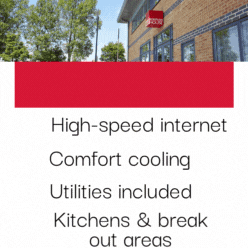In case you missed it see what’s in this section
Let's Talk
Breaking Down Static vs. Rotating Proxies: Which One Fits Your Business Goals

Proxies are essential for businesses to securely collect data and manage their online presence. Acting as intermediaries, they enhance security and privacy, providing detailed controls such as request filtering, bandwidth management, and activity logging. These capabilities are vital for any company aiming to safeguard and optimize its internet operations, making Infatica for business an ideal solution.
Consider a proxy server as your business's digital gateway - it handles all your internet communications while protecting your actual network infrastructure. Modern proxy solutions can also provide load balancing, caching capabilities, and enhanced security features, making them invaluable for scaling operations. For enterprise-level operations, proxies enable:
- Web intelligence gathering from multiple locations simultaneously with customizable geographic targeting
- Comprehensive price analysis across global marketplaces with real-time data synchronization
- Advanced competitor monitoring systems with automated data collection
- Protection against sophisticated cyber threats and targeted data breaches
- Multi-regional content delivery optimization with local cache servers
- Secure access to business-critical resources with granular access control
- Automated market research with geolocation verification
- Brand protection through counterfeit detection and monitoring
The choice of proxy type dramatically affects these operations' efficiency and success rate. Each solution offers unique advantages depending on your specific business requirements and operational scale.
Static proxies explained
Key characteristics
Static proxies maintain the same IP address over extended periods, making them ideal for operations requiring consistent online identity. These proxies typically operate from enterprise-grade data centers, providing reliable connections and predictable performance metrics. Modern static proxy implementations include advanced monitoring tools, automated failover systems, and real-time performance analytics to ensure maximum uptime and reliability.
Best use cases
- When your business needs a stable, long-term presence online, static proxies offer significant advantages:
- Building trusted profiles on e-commerce platforms with consistent access patterns
- Managing multiple business accounts securely across various platforms
- Conducting targeted market research in specific regions with reliable data points
- Maintaining consistent access to subscription-based services and APIs
- Operating automated customer service systems with stable connection points
- Monitoring specific competitors over time with dedicated IPs
- Performing regular quality assurance testing from fixed locations
- Maintaining long-term web scraping projects requiring session persistence
Advantages and limitations
Benefits:
- Exceptional connection stability with guaranteed uptime
- Lower long-term operational costs through predictable pricing
- Consistent performance metrics for better planning
- Simplified technical implementation and maintenance
- Higher success rates with authentication-heavy platforms
- Dedicated support for specific geographic regions
- Better compatibility with legacy systems
Drawbacks:
- Increased vulnerability to IP blocks due to usage patterns
- Limited geographic diversity options
- Reduced anonymity compared to dynamic solutions
- Restricted scalability for rapid growth
- Higher risk of detection during intensive use
- More expensive for global operations

Rotating proxies in detail
How they work
Rotating proxy systems automatically cycle through different IP addresses based on customizable parameters. Modern implementations include sophisticated rotation algorithms that can adapt to website behavior patterns and detection systems. These systems employ machine learning to optimize rotation timing and patterns, significantly improving success rates for data collection tasks. Advanced rotating proxy networks also incorporate real-time ban detection and automatic IP quality assessment to maintain optimal performance.
- Ideal applications
- Rotating proxies excel in scenarios requiring high-volume data collection:
- Enterprise-scale web scraping operations with millions of requests
- Dynamic price intelligence gathering across multiple markets
- Global ad campaign verification with geographic targeting
- Multi-regional SEO performance tracking and analysis
- Real-time market analysis with concurrent data collection
- Distributed data collection systems with high availability requirements
- Large-scale competitor monitoring across different regions
- Automated content aggregation from diverse sources
Strengths and weaknesses
Advantages:
- Superior anonymity protection through constant IP rotation
- Excellent success rates for high-volume data gathering
- Extensive geographic coverage options
- Enhanced ban prevention through intelligent rotation
- Flexible scaling capabilities for growing operations
- Advanced anti-detection features with adaptive algorithms
- Better resilience against sophisticated blocking systems
Limitations:
- Higher initial setup and maintenance costs
- Complex implementation requiring specialized expertise
- Variable connection performance across different IPs
- Additional technical overhead for management
- More sophisticated monitoring requirements
- Potential session continuity challenges
- Higher bandwidth costs for large-scale operations
Making the right choice
Factors to consider
Success in proxy implementation depends on careful evaluation of core business needs and technical capabilities. Each factor directly impacts operational effectiveness and return on investment.
- Current and projected data collection volume requirements
- Target websites' security sophistication and anti-bot measures
- Available technical expertise and support resources
- Budget flexibility for initial setup and ongoing maintenance
- Required geographical coverage and diversity
- Performance requirements and latency tolerance
- Scalability needs for future growth
- Compliance requirements and regulatory considerations
- Integration needs with existing systems
Cost considerations
While static proxies offer lower per-IP costs, they require larger initial infrastructure investments. Typical static proxy costs range from $5-20 per IP monthly, while rotating proxies use bandwidth-based pricing at $0.5-3 per GB. Consider both immediate expenses and long-term operational costs when making your decision. Factor in potential scaling costs as your operation grows.
Best practices for implementation
- Setup recommendations
- Begin with controlled testing in staging environments
- Implement comprehensive monitoring systems with alerts
- Maintain detailed performance and error logs
- Establish clear rotation policies and schedules
- Deploy robust error handling mechanisms
- Create redundant backup infrastructure
- Document all configuration changes and updates
- Regular performance benchmarking and optimization
- Implement rate limiting and request queuing
- Develop clear escalation procedures
Common pitfalls to avoid
- Aggressive request patterns triggering blocks
- Inadequate proxy validation procedures
- Poor error management strategies
- Insufficient monitoring coverage
- Overlooked security vulnerabilities
- Incomplete scaling plans
- Neglected maintenance routines
- Inappropriate request patterns
- Lack of proper documentation
- Insufficient testing before deployment
Conclusion
Choosing between static and rotating proxies requires careful consideration of your business objectives and operational requirements. Static proxies excel in scenarios demanding stable, long-term presence and consistent performance. Rotating proxies offer superior flexibility and anonymity for large-scale data collection efforts.
Weather in Swindon
Listings




















